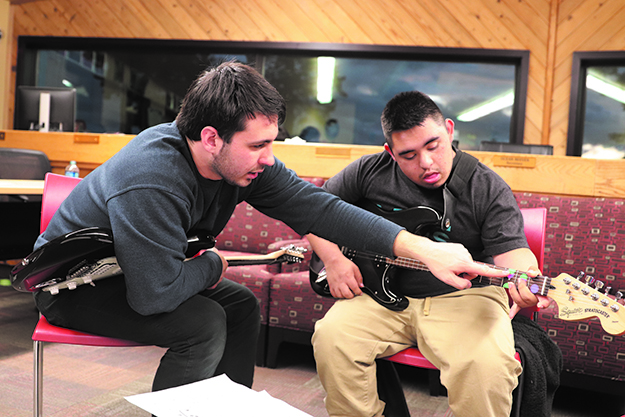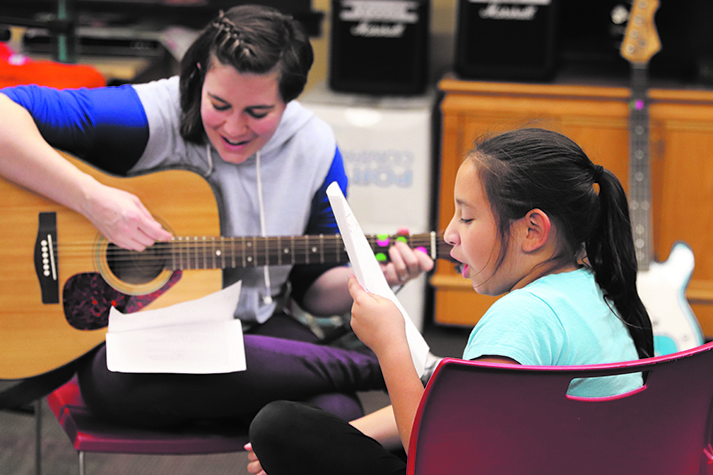
By Kalvin Valdillez, Tulalip News
“I think music is important because I feel like it can have a message and it can help people through a hard time. I feel like music lifts people up,” expressed Tulalip tribal member, Tyler Fryberg.
Music is a universal language. Spoken through drum patterns and chord progressions, music helps communicate how you feel – happy, sad, angsty, dance-y, nostalgic or smitten. And whether you are the songwriter or a carpool karaoke master, music helps you emit that emotion that you might otherwise bottle-up or bury. Many people often tie emotions to music, so when they hear a song on the radio or on their shuffle, they are momentarily taken away to a certain era in their lifetime.
For Indigenous people, music played a significant role in our ancestor’s spirituality and culture. Offering songs to the Creator, the earth and the water is a common practice that is held prior to gatherings across Native America. Songs that tell stories and offer blessings are sung in traditional languages and passed on through the generations. Some songs are so sacred and powerful that they are only performed during ceremony. And that connection Natives feel when hearing those drums and singing those songs with your fellow tribal members is indescribable.
When speaking of emotional and mental health, music can help alleviate extreme feelings and give you the courage and confidence to get some serious healing work done. More and more people are coming to realize what Native people have known for generations; music is medicine.
The Snohomish County Music Project (SCMP) is continuing to have a meaningful impact on the Tulalip community in the wake of a worldwide pandemic. With services offered at the Betty J. Taylor Early Learning Academy (TELA) and Quil Ceda Tulalip Elementary (QCT), as well as several other schools throughout the Marysville School District (MSD), the music project assisted close to 500 tribal students either enrolled Tulalip or with another sovereign nation.

“We’re a music therapy organization and we’re here to support individual and collective well-being,” explained SCMP Music Therapist, Vee Fansler. “We have an anti-oppressive approach and a trauma informed approach, so everything we do is coming with an awareness of the bigger context that shape our internal health.”
Added Colby Cumine, Music Therapist, “We are a non-profit and we provide music therapy services to the greater Snohomish county area. We have a lot of different programs and people we work with ranging from infants to adults; adults with dementia, adults and kids with disabilities, kids with trauma, veterans and in-patient psych hospitals.”
Natives withstood years of violence as the U.S. Government attempted to erase our culture and identity. The forced assimilation era, and the unspeakable acts that happened at the boarding schools, were traumatic experiences that involuntarily trickled down through the generations. And without a complete understanding of how generational trauma affects one’s well-being, many people’s mental state went untreated for a number of years and certain cycles continued or in some situations, escalated.
SCMP has taken an approach to help people heal and work through traumatic life events by using music therapy. For the past several years, Vee’s voice has become widely recognizable amongst the youth as they built a strong bond together through the common language of music. Colby is another positive influence on the Tulalip youth as he also hosts music therapy sessions, both individual and group, with TELA and MSD elementary students and the weekly ‘yoU ROCK’ rock band rehearsals, which have become quite the social happening amongst young adults living with special needs.
The music project was in perfect rhythm, reaching a large volume of people and providing them with the necessary tools, resources and outlets to heal after life altering events. But then the team reached a caesura, a short abrupt break in the music, when the coronavirus struck and the SCMP was forced to switch tempos.
“There are so many needs that are present in our communities, we needed to make ourselves available to support people’s mental health, in the context of the pandemic, and not put people at more risk,” expressed Vee. “We did a lot of outreach to children and families because we usually contact people through schools, especially at Tulalip, most of our work happens in the schools.”
Opting to continue providing services to their clients during the pandemic, the music project decided to go completely digital and since the beginning of the pandemic, their clients have grown their knowledge about music by working on arrangements that they are familiar with and that appeal to them. The music they work on, both individually and as a group, crosses barriers and multiple genres ranging from classic Disney sing-a-longs to old school hip hop and even country-western.
“We created a series of YouTube videos. Some of the therapists recorded songs to send out to people in the community who are stuck at home for the first time and maybe in need of things to do or activities,” said Colby. “I started a weekly livestream on Facebook, we have a YouTube playlist that families can use at home to interact with their kids, and we will be having these weekly livestream jam sessions. And in addition to that, reaching out to everyone I typically see in a small group setting or in a one-on-one capacity, for me that was mostly kids in the behavioral program, and seeing if they would be able to do telehealth.”
Vee explained that initially the SCMP attempted to transfer all of their services to an online format, but quickly learned that Zoom and teleconference music sessions come with a whole new set of challenges, such as timing.
“We can’t do live music very well with another person over the computer,” Vee stated. “That [timing] lag has been a struggle, and doing music with very young children has been a struggle. Prior to the pandemic we had a lot of individuals we saw at early learning that involved a lot of moving through space together and playing instruments together, and that is so different on a computer screen. The programs that have really translated the best have been with older children, ages 10 and up, who have a lot of experience with technology and interest in planning out sessions and practices for themselves.”
One key emphasis the music therapists are focusing on during this time period is how to navigate through these COVID-19 times safely, and how to process those emotions in a healthy, productive manner.
“There were a lot of folks who were grateful and happy we were able to continue to meet over Zoom,” Colby said. “They were overjoyed to interact with their peers again. Initially there was confusion in terms of what things were going to look like, because we still didn’t know if school would be coming back anytime soon. So in those therapy sessions, the focus was working through those feelings of confusion and sudden change in routines and schedules. And also working through those anxieties and uncertainties of the school year ending, and people expressing sadness of not being able to say goodbye to their friends who were graduating or moving on to a new school.”
When MSD canceled in-person lectures for the safety of their students and faculty, they in-turn provided their students with Chromebooks in order for them to continue their education online, which included music therapy sessions.
“The Chromebooks gave us access to kids and families,” said Vee. “For us to know the families had the necessary tools and technology for telehealth sessions, we were able to do instrument loans during the pandemic.”
“I am learning the ukulele with Colby,” happily reported Tyler. “I am learning how to play ‘You Got a Friend in Me’, and I have learned how to play happy birthday songs. I may not practice every day but I do practice between thirty minutes to one hour when I do practice.”
The music project has also continued with the rock band project, holding weekly rehearsals in which bandmates can catch up, converse and create.
“The rock band has grown in size since the pandemic,” Vee said. “That’s our group with young adults with developmental disabilities. The goal of that group has always been giving people the opportunity to connect with their peers. Especially since we know that disabled children tend to be separated from their peers a lot. And when they get out of the school system, all of those social supports that were built sort of just fall away. I think that’s a group where their top priority was just wanting to see each other, and they didn’t care as much if the musical product was perfect in terms of the timing. They mainly just wanted to chat, share their songs, listen to things together, and laugh. That has translated really well into telehealth.”
During a time when many are self-isolating, the unknown that tomorrow may bring weighs heavy on a lot of minds. Many are experiencing loneliness and that’s why it’s important programs like the SCMP are available to those seeking assistance with their mental health.
“It feels great to have Colby and the music project because I still get to do music class on Zoom during this time,” Tyler expressed. “I still feel like it is the same no matter how we have to do the music. It is rewarding and you get to have fun and be around people and learn music. Rock band sessions really help with social skills and being confident with yourself. I had a hard time feeling confident but with Colby’s help, it made me feel better in myself.”
The Snohomish County Music Project is currently accepting new clients. If you or your children are interested in learning a new skill, while equipping yourself with the emotional tools to navigate the coronavirus and end trauma cycles, please reach out to the music project at (425) 258-1605 or visit their website, Facebook or YouTube pages for more information.
“I enjoy working with these kids and their families,” said Colby. “I enjoy their personalities and who they are. I appreciate being able to work and interact with them. This is a very difficult, confusing and challenging time but we will be able to work through it together. I’m happy there is a strong community and that we’re able to be a part of it with the Tribe.”
Vee added, “The main thing I hope the people know is we are here for anyone in the Tulalip community who has any difficulties that are coming up in terms of mental health, in feeling connected with their children or needing resources in continuing to care for children, in dealing with the trauma that comes with the pandemic and other traumas that have layered on top of that. I’m really thankful that we’ve been able to stay connected with this community and to keep having the relationships with the kids that we really care about.”